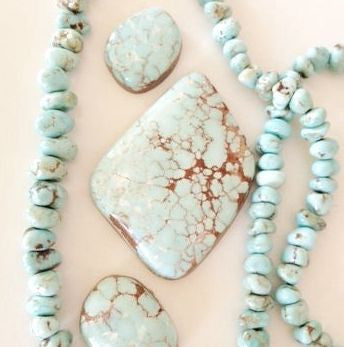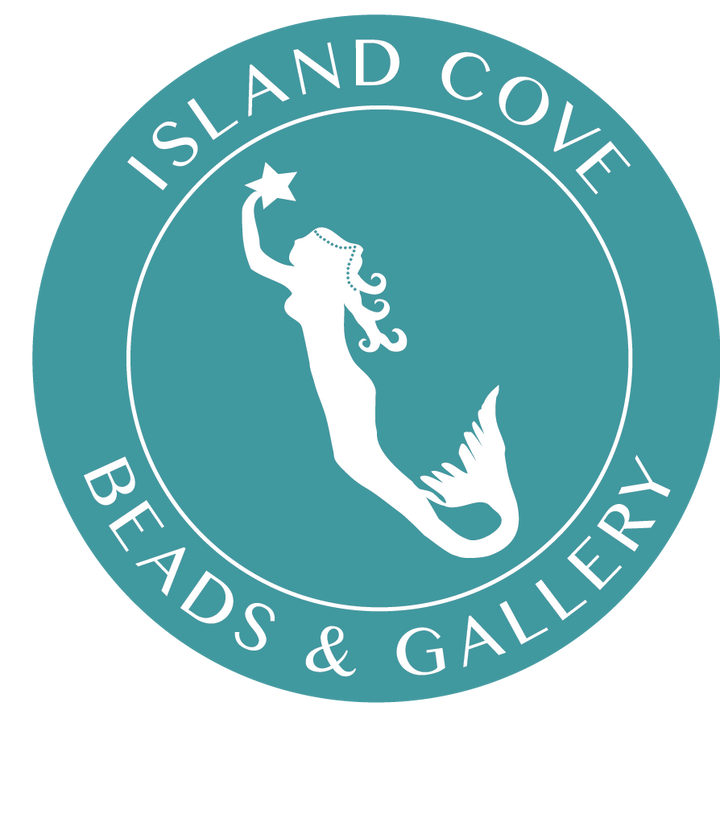January 23, 2017

Simply the thought of the word "turquoise" takes your mind's eye to that familiar blue color. Did you know that turquoise obtains its color from the heavy metals in the ground where it forms? It comes in a much wider range of colors than most people would think. In fact, the colors can vary greatly even within a single mine.


Turquoise by definition contains copper and is a Copper Aluminum Phosphate. When copper is more predominant, it takes on the sought after blue shades. When there is iron present, the turquoise reveals a more green color. Some turquoise found in Nevada, such as Carico Lake, contains a significant presence of zinc and iron which can form a very unusual yellow green to lime green color. If more aluminum than normal is indicated, the turquoise is a green to white color.
And this is where the mystery begins! In the early 1990's a very pale blue (almost white) turquoise was discovered in the original Dry Creek mine (aka: the Godber-Burnam mine). This is called Dry Creek Turquoise. The scarcity of the heavy metals in this area caused the stones to be a very rare pale blue and nearly white. Thus it was referred to by many as "Sacred Buffalo Turquoise," but was not marketed as such by the owners of the mine. At first, turquoise jewelers were not interested in this material, however they soon realized how rare it was, making it irresistible! Another white material thought to be white turquoise was also found in this mine, but when tested, turned out to be Aluminite.
In Tonopah, Nevada the Otteson family, who are well known turquoise miners, claimed to have unearthed rare veins of material that were white and hard enough to take a polish. They call it "White Turquoise" from the White Buffalo Mine. Although many are skeptical, I can not find information that clearly proves one way or the other. The fact is that most turquoise mines yield light to white material that is so soft, it is like chalk. It is unsuitable for polishing into stones, yet when tested, does prove positive for the elements of turquoise. It can be stabilized, but that almost always brings out the darker blue or green color we've come to expect.
There are two other stones that are important to mention as they are often sold as, or mistaken for white turquoise. Howlite has for many years been dyed blue and used as imitation turquoise, but when left in its natural state with its grayish veins appears remarkably similar to what one might think is white turquoise. The other is Magnesite, now being marketed as "Crazy Horse." Magnesite, a creamy ivory white stone with a rich brown veining is a beautiful stone all on its own merit. But don't be fooled, neither of these stones are white turquoise.


There has been much debate over white turquoise and whether or not it even exists. The spirited debates continue to this day. Turquoise fans tend to have a preferred shade, but still can't resist the bright blue that is synonymous with its name. Whether you like blue, green, or even white turquoise, any of these stones is sure to please when integrated in your jewelry designs!
October 18, 2023
May 29, 2022
This month, Island Cove is featuring the Herringbone stitch. A geometric, versatile pattern for using different sizes and shapes of beads to create beautiful beaded jewelry!
November 27, 2021
Island Cove is putting up their tree and getting ready to sell their unique hand-crafted Christmas decorations.
Sign up to get the latest on sales, new releases and more …
